Resolve Azure DevOps and Office integration issues
Azure DevOps Services | Azure DevOps Server 2022 - Azure DevOps Server 2019
If the Team ribbon is missing in Microsoft Excel, as shown in the following image, do the procedures in this article to resolve the issue.

Note
The Azure DevOps Office integration is feature complete with no plans for updates or improvements. Future investments will focus on native tooling for bulk importing or updating work items using CSV files. If you encounter issues with the Office integration, consider using this alternative. All Office integration tasks require an installed version of Visual Studio or the free Azure DevOps Office Integration 2019, which installs the Azure DevOps Office Integration Add-in. For prerequisites, see Azure Boards and Office integration.
Important
Microsoft Project Integration and the TFSFieldMapping command aren't supported for:
- Visual Studio 2019 and Azure DevOps Office Integration 2019.
- Azure DevOps Server 2019 and later versions, including Azure DevOps Services.
Full support for Microsoft Excel integration is maintained, allowing bulk import and update of work items. Alternatives to using Microsoft Project include:
- Delivery Plans
- Marketplace extensions like Project Connect or GANTT chart
Install Azure DevOps Integration 2019
This tool allows you to connect to Azure Boards from Excel. To install the Azure DevOps Integration 2019 tool, follow these steps:
Download the Azure DevOps Office Integration 2019 tool.
Install the tool by running the downloaded file.
Restart Excel to see the Team ribbon.
If you still don't see the Team ribbon, follow the steps in the following sections.
Enable the Azure DevOps add-in
In Excel, select File > Options.
Select Add-ins > COM Add-ins from the Manage dropdown menu > Go.
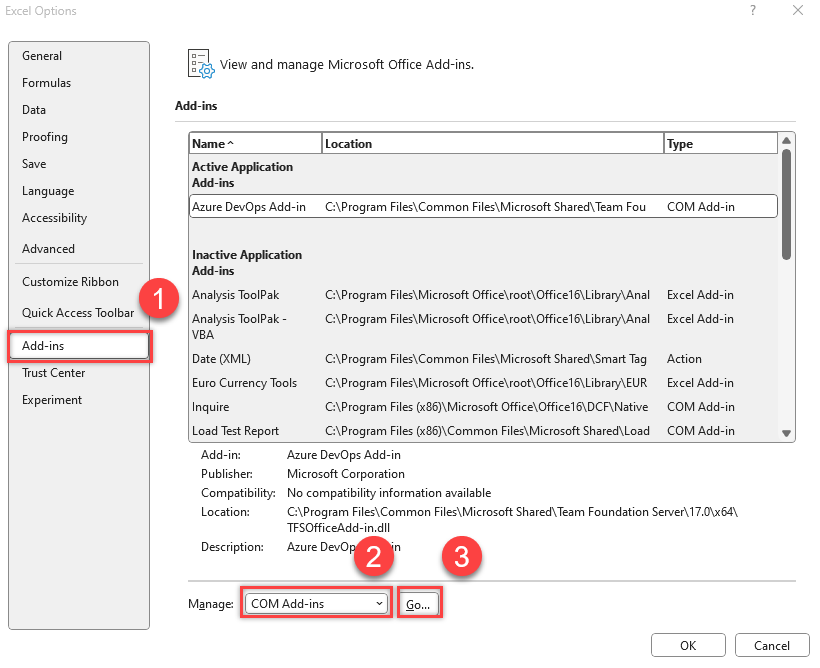
Make sure there's a check in the Team Foundation Add-in box.
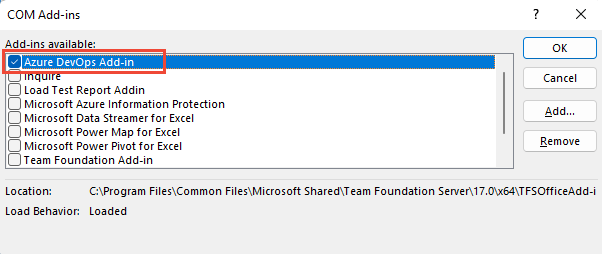
Restart Excel.
The Team ribbon shows.
If the Team ribbon doesn't appear at next launch, the load behavior of the add-in might be changed, so do these next steps.
Update the registry
Launch the Registry Editor from your Windows Start Menu by entering
regeditin the Search or Run box.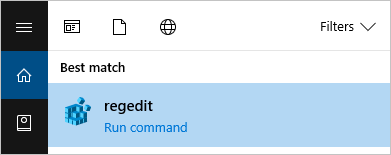
Go to one of the following paths containing the TFCOfficeShim.Connect.[version] folder:
Note
If there are multiple folders with the same name, select the one with the highest version number.
HKEY_CURRENT_USER\SOFTWARE\Microsoft\Office\Excel\Addins(if this key doesn't exist, try one of the following options)HKEY_LOCAL_MACHINE\SOFTWARE\Microsoft\Office\Excel\AddinsHKEY_LOCAL_MACHINE\SOFTWARE\WOW6432Node\Microsoft\Office\Excel\Addins
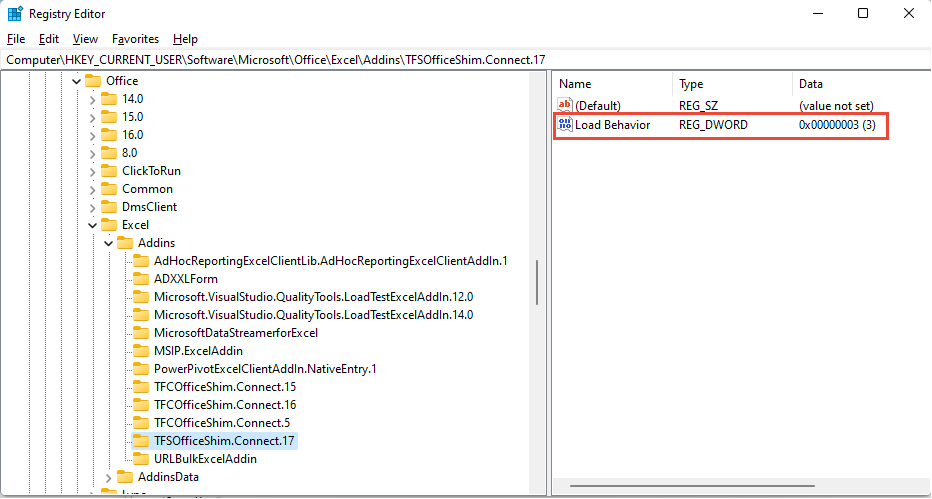
Double-select to open LoadBehavior and set the value data field to
3. If the value is0the Team ribbon doesn't load.Select OK and restart Excel.
For more information about the LoadBehavior entry, see Registry Entries for VSTO Add-ins, LoadBehavior values.
Verify if the add-in is disabled
From the Excel File menu, select Options.
Choose Add-ins and from the Manage dropdown menu and select Disabled Items > Go.
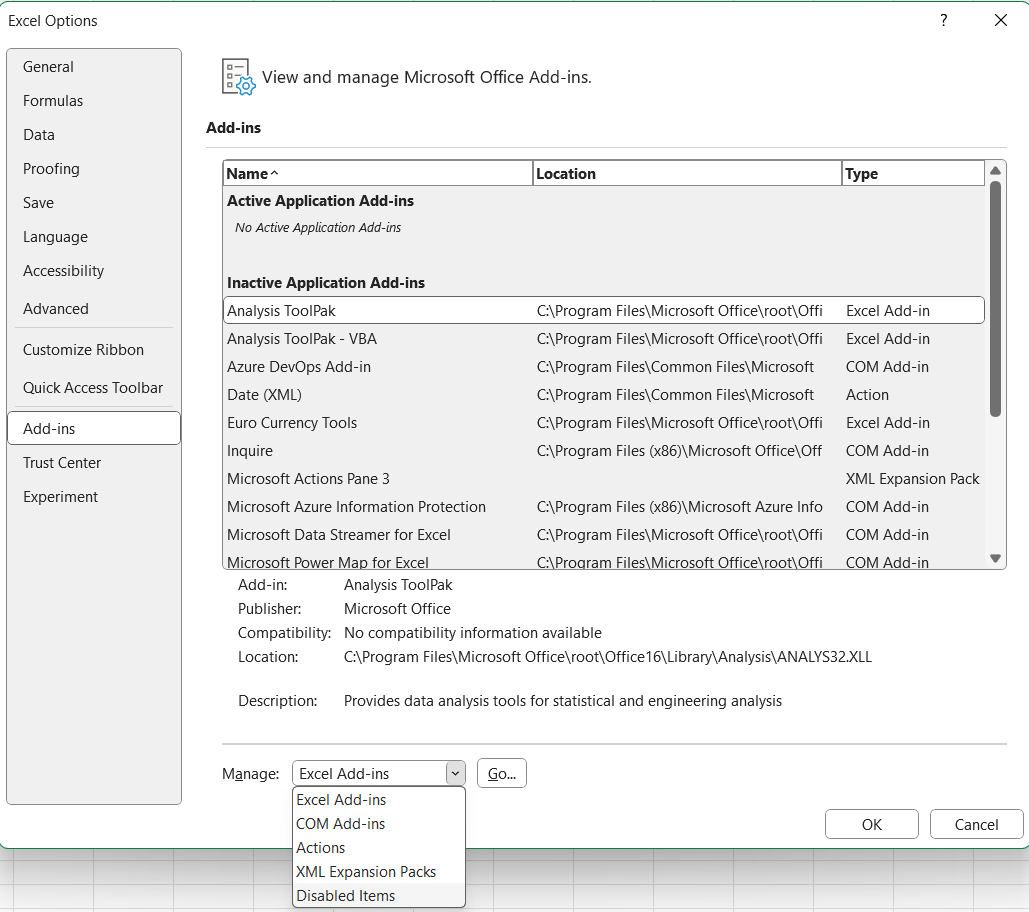
If you see Azure DevOps Add In in the list, choose it and select Enable.
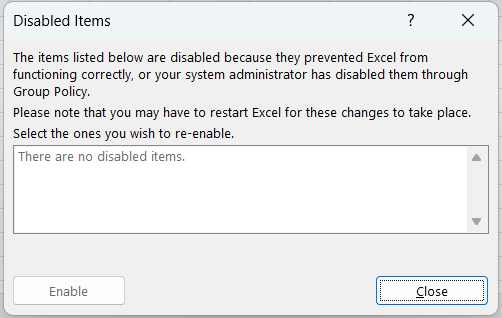
Office add-in doesn't load or open in Excel when Visual Studio fails
To connect to Azure Boards, go to the Team ribbon and choose New List. If the New List dialog fails to open, or you receive TF86001 or similar error message, then you might need to repair Visual Studio.
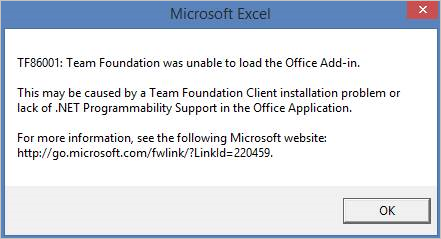
This error usually occurs when Visual Studio is installed before Office Excel or Project. In this case, the Visual Studio Tools for Office Runtime aren't configured correctly. To fix this error, repair your Visual Studio installation.
Note
For authentication issues, like TF31003 and TF30063, see User account does not have permission.
Prerequisites
Install Visual Studio to ensure that you have access to the Visual Studio Command Prompt and the Gacutil.exe (Global Assembly Cache Tool). If you don't have Visual Studio, you can install the Visual Studio Community edition for free.
Run the Gacutil tool
Open the Visual Studio Command Prompt and choose to run it as an administrator.
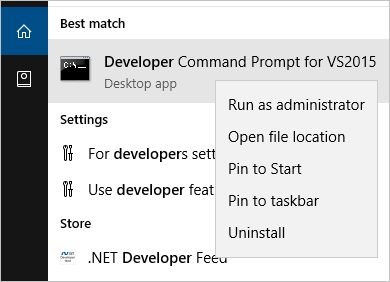
Run the following commands based on your software:
Software Commands Microsoft 365 GACUTIL /I C:\Windows\assembly\GAC_MSIL\Policy.14.0.Microsoft.Office.Interop.Excel\15.0.0.0__71e9bce111e9429c\Policy.14.0.Microsoft.Office.Interop.Excel.dllGACUTIL /I C:\Windows\assembly\GAC_MSIL\Policy.14.0.office\15.0.0.0__71e9bce111e9429c\Policy.14.0.Office.dllOffice 2016 and Office 2013 GACUTIL /I C:\Windows\assembly\GAC_MSIL\Policy.12.0.Microsoft.Office.Interop.Excel\15.0.0.0__71e9bce111e9429c\Policy.12.0.Microsoft.Office.Interop.Excel.dllGACUTIL /I C:\Windows\assembly\GAC_MSIL\Policy.12.0.office\15.0.0.0__71e9bce111e9429c\Policy.12.0.Office.dllOffice 2010 GACUTIL /I C:\Windows\assembly\GAC_MSIL\Policy.12.0.Microsoft.Office.Interop.Excel\14.0.0.0__71e9bce111e9429c\Policy.12.0.Microsoft.Office.Interop.Excel.dllGACUTIL /I C:\Windows\assembly\GAC_MSIL\Policy.12.0.office\14.0.0.0__71e9bce111e9429c\Policy.12.0.Office.dllAfter you successfully run the
GACUTILcommands, restart Excel and look for the Azure DevOps Integration Tool for Office add-in.
If the previous steps don't help, try the next steps:
Uninstall Office and then reinstall Office.
Contact Microsoft via the Developer Community.
User can't sign in to Azure DevOps from Excel after password change
If you changed your network password and start receiving authentication errors with the new account info, you might be experiencing a known issue. The token stored in Visual Studio is no longer valid, but the system doesn’t recognize the need to refresh it. You don't need to take any action; the token expires eventually, and authentication begins working again, though the delay is unpredictable. Use the following workaround to manually remove the token.
Remove the token from the registry
Close all open Excel instances.
Save and then clear the registry path by running the following commands from an elevated Command Prompt (run as administrator):
reg export HKEY_CURRENT_USER\SOFTWARE\Microsoft\VSCommon\14.0\ClientServices\TokenStorage\VisualStudio\VssApp %TEMP%\oicreds.regreg delete HKEY_CURRENT_USER\SOFTWARE\Microsoft\VSCommon\14.0\ClientServices\TokenStorage\VisualStudio\VssAppOpen Excel and it prompts for sign-in when it connects to Azure DevOps.
Wait until the token expires or delete this reg key every time a password changes if configured in a way that causes this issue.
Intermittent issues doing refresh and publish
If you get an error during refresh or publish, there might be a Conditional Access Policy in Microsoft Entra ID. To resolve this issue, clear the contents of the folder: %LOCALAPPDATA%\.IdentityService.
Can't cast COM object of type Microsoft.Office.Interop.Excel.ApplicationClass
You might get an error message when opening a work item list in Excel, triggered from Team Explorer. For more information, see How to solve 'Unable to cast COM object of type Microsoft.Office.Interop.Excel.ApplicationClass' to interface type 'Microsoft.Office.Interop.Excel._Application.''